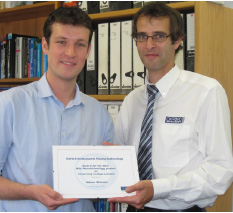Oxford Instruments are delighted to announce that Adnan Mehonic is the recipient of our first Oxford Instruments Plasma Technology award for the Best MSc Project in Nanotechnology at UCL, entitled 'Current transport studies of silicon nanoclusters'.
 L to R: Adnan Mehonic, MSc receives his Award for Best MSc Project in
nanotechnology at UCL from Michael Stokeley, EMEA Sales Manager, Oxford Instruments Plasma Technology
L to R: Adnan Mehonic, MSc receives his Award for Best MSc Project in
nanotechnology at UCL from Michael Stokeley, EMEA Sales Manager, Oxford Instruments Plasma Technology
The project, supervised by Dr Tony Kenyon, investigated metal-oxide-semiconductor (MOS) devices containing silicon nanoclusters doped with erbium ions, and analysed and discussed the conduction mechanism whose understanding is essential for further development of silicon-based photonics devices.
Professor Richard Jackman, Director of the MSc programme in Nanotechnology at the Department of Electronic and Electrical Engineering & London Centre for Nanotechnology commented, "We were delighted with the high calibre of our MSc projects last year, but Adnan's work and results on 'Current transport studies of silicon nanoclusters' was judged the best in his year". Dr Kenyon added, "The work resulted in patenting a Memristor Resistive Switching Device, and Adnan is now working on a PhD at UCL to further this research. We are pleased to have chosen his work to win the prize."
Mike Cooke, Chief Technology Officer for Oxford Instruments Plasma Technology said, "As a company we aim to pursue responsible development and deeper understanding of the world through Science & Technology, and we are delighted to support a prize intended to recognise and promote outstanding achievements of young scientists in the field of nanotechnology research."
About Oxford Instruments Plasma Technology
Oxford Instruments Plasma Technology offers flexible, configurable process tools and leading-edge processes for the precise, controllable and repeatable engineering of micro- and nano-structures. Our systems provide process solutions for nanometre layer epitaxial growth of compound semiconductor material, etching of nanometre sized features and the controlled growth of nanostructures. These solutions are based on core technologies in plasma-enhanced deposition and etch, ion-beam deposition and etch, atomic layer deposition and hydride vapour phase epitaxy. Products range from compact stand-alone systems for R&D, through batch tools and up to clustered cassette-to-cassette platforms for high-throughput production processing.